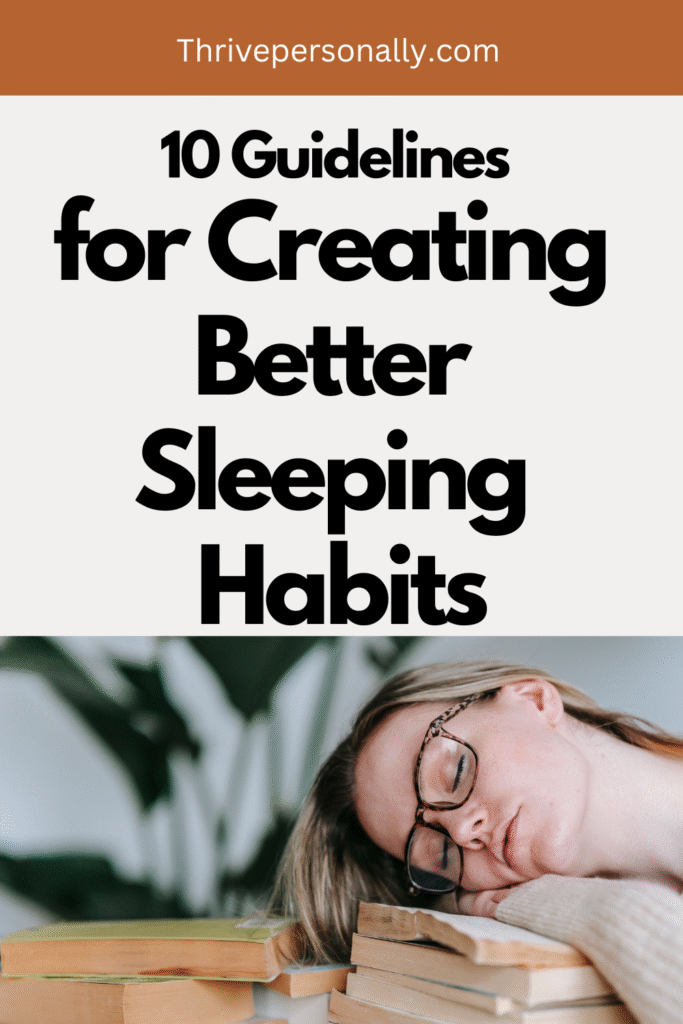Sleep is a critical part of your life, yet many people don’t do it well. You might struggle with falling asleep, waking up in the middle of the night, or not feeling refreshed in the morning. When sleep is poor, it drains both your body and mind. You may feel tired all day, low in energy, and off in your mood. If you’re often waking up tired or dragging through your day, it’s time to consider changing your sleeping habits.
The good news is you can reset your sleep pattern—without pills or expensive tools. All it takes are a few simple changes in your daily habits, how you prepare for bed, and how you think about rest. These small changes train your body and mind to fall asleep naturally and stay asleep through the night.
10 Guidelines for Creating Better Sleeping Habits
1. Go to Sleep and Wake Up at the Same Time Each Day
Your body runs on a built-in clock called the circadian rhythm. It tells your body when to sleep and when to wake. If you go to bed and wake up at different times each day, your body clock gets confused. This makes it harder to fall asleep and harder to wake up feeling rested.
Try to keep a regular sleep schedule—even on weekends. Over time, your body will learn the pattern, and you’ll fall asleep more easily. A consistent routine tells your brain when to shut down and when to stay alert.
Read also: 51 Bedtime Affirmations to Help You Sleep Better and Feel Peaceful
2. Make Your Room Sleep-Friendly
Your bedroom has a big effect on your sleep. Noise, light, and clutter can make it harder to relax. Create a space that is quiet, cool, dark, and clean. Make sure your bed is comfortable and feels inviting.
Avoid using your bed for work, TV, or scrolling through your phone. Let your brain connect your bed with rest—not with stress or activity. When your environment is peaceful, your mind can follow.
Read also: 9 Key Reasons Why Quality Sleep is Important for Your Health
3. Avoid Caffeine and Sugar at Night
What you eat and drink affects your sleep. Caffeine—found in coffee, tea, soda, and chocolate—can stay in your system for hours. Drinking it late in the day may keep you awake long past bedtime.
Sugar can also make your body feel jumpy or restless. Try to skip candies or sweet drinks before bed. Instead, choose something calming like warm milk or plain water. These simple choices help your body wind down gently.
Read also: 8 Best Things to Do When You Can’t Sleep at Night
4. Limit Screen Time Before Bed
The blue light from phones, tablets, and TVs tricks your brain into thinking it’s still daytime. This blocks melatonin—the hormone that helps you sleep—and keeps your brain too active to rest.
Turn off screens at least 30 to 60 minutes before bed. Use that time to read, journal, or listen to soft music. These calming activities help your mind shift into sleep mode.
5. Don’t Take Long Naps During the Day
Short naps are fine, but long or late naps can mess with your sleep at night. If you nap in the afternoon, you might not feel sleepy enough to go to bed on time.
Keep your naps short—about 20 to 30 minutes—and take them earlier in the day. That way, you boost your energy without throwing off your nighttime sleep.
6. Move Your Body During the Day
Physical activity helps you sleep better. When your body gets tired in a healthy way, it’s easier to fall asleep at night. Exercise also lowers stress and clears your head.
Try to move your body each day. Walking, stretching, dancing—any kind of movement helps. Just avoid heavy workouts right before bed, as they might make you feel too awake to sleep.
7. Build a Calming Bedtime Routine
A bedtime routine signals your body that it’s time to relax. When you repeat calming activities each night, your brain begins to unwind on its own.
Your routine doesn’t need to be long—just 20 to 30 minutes. You can brush your teeth, wash your face, dim the lights, write in a journal, or listen to quiet music. These small habits train your mind to slow down and get ready to rest.
8. Don’t Lie in Bed Too Long If You Can’t Sleep
If you’ve been in bed for 20 to 30 minutes and still can’t sleep, don’t keep tossing and turning. Staying there may make your brain associate bed with frustration instead of rest.
Instead, get up and do something calming in another room—read a book, stretch, or do breathing exercises. Once you feel sleepy, return to bed. This helps your brain reconnect the bed with sleep, not stress.
9. Quiet Your Mind Before Bed
Racing thoughts often keep people awake. You may lie in bed thinking about the past or worrying about the future. To help your mind relax, practice stillness before bed.
Use slow, deep breathing or visualize something calm. You can also write down your thoughts in a journal and promise to deal with them tomorrow. Emptying your mind helps you let go of stress and fall asleep more easily.
According to The Sleep Foundation, relaxing the mind is one of the most effective ways to improve your sleep quality.
10. Be Patient and Keep Trying
Good sleep habits take time to build. You might not notice a big change after one night or even one week. But if you stick to these habits each day, your body and brain will begin to adjust.
Be kind to yourself. Progress may feel slow, but it’s happening. If you stay consistent, your sleep will improve, and you’ll feel the difference during the day.
For more science-backed guidance, explore the Centers for Disease Control and Prevention (CDC) tips on sleep health.
Final Thoughts
Good sleep doesn’t come from expensive gear or fancy gadgets. It comes from good habits. The way you spend your day, how you care for your body, and how you settle your thoughts at night all shape your sleep.
You can’t fix your sleep in one night, but every small change helps. The more you follow these ten steps, the more your body learns when and how to rest. And when you sleep better, you live better—feeling more energetic, focused, and emotionally balanced.
Start today. Rest is a gift. And you deserve to wake up feeling calm, strong, and ready to take on your day.
Save the pin for later



